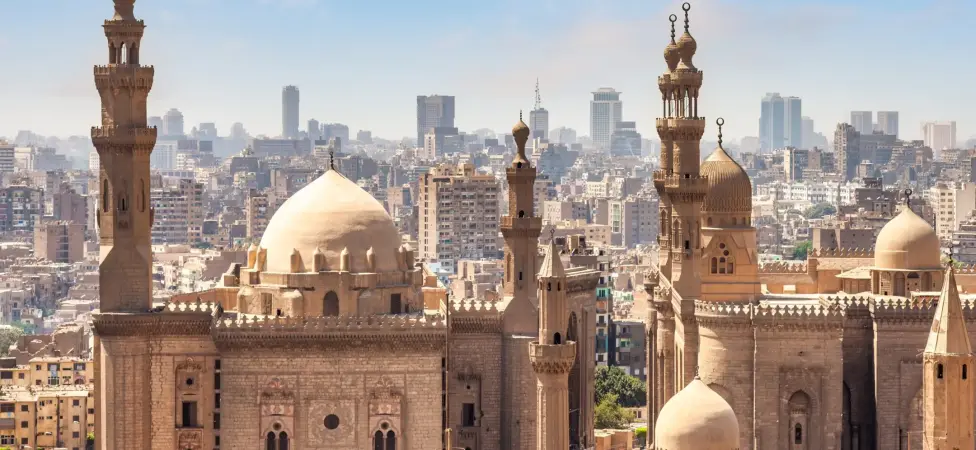Egypt Leverages AfCFTA to Boost Trade Across Africa’s $3.4 Trillion Market
By Paul Cochrane
Published: March 18, 2025
Updated: June 11, 2025
📍 Cairo, Egypt – Aerial view of the historic city skyline, featuring Sultan Hassan and Al-Rifai mosques
In partnership with CIB Egypt
Egypt is uniquely positioned to become a continental trade powerhouse, thanks to its extensive portfolio of multilateral trade agreements and strategic location at the crossroads of Africa, the Middle East, and Europe.
Egypt’s Strategic Trade Advantage
Egypt holds more multilateral trade agreements than any other African or Arab country. It is a member of:
The Common Market for Eastern and Southern Africa (COMESA)
The Agadir Agreement linking North African nations and Jordan
The Greater Arab Free Trade Area (GAFTA)
The EU-Egypt Free Trade Agreement
The Qualifying Industrial Zones (QIZ) for preferential access to the U.S. market
In 2021, Egypt joined the African Continental Free Trade Area (AfCFTA)—the world’s largest free trade area, opening doors to a $3.4 trillion market with 1.5 billion consumers.
AfCFTA: Unlocking Intra-African Trade Opportunities
Despite launching during the COVID-19 pandemic, the AfCFTA presents a game-changing opportunity for Egypt to expand trade, investment, and services across Africa. The trade deal aims to remove 90% of tariffs in its first phase and expand to services, intellectual property, and e-commerce in later phases.
Egypt’s intra-African trade reached $8.3 billion in 2023, marking an 11.4% year-on-year growth. The government aims to push this figure to $15 billion by the end of 2025.
“The AfCFTA’s framework is encouraging more Egyptian businesses to explore new African markets,” says Islam Zekry, Group CFO and Executive Board Member at Commercial International Bank (CIB).
Egyptian Business Expansion Across Sub-Saharan Africa
Egyptian industries—from pharmaceuticals to construction—are gaining ground in key African markets. CIB has made strategic moves in Kenya and Ethiopia, enabling smoother financial services and trade finance support.
Construction: Egyptian firms are spearheading infrastructure and housing projects in East Africa.
Pharmaceuticals: Egypt is supplying affordable, high-quality medicine across African nations.
Banking & Fintech: CIB is facilitating cross-border transactions and supporting SME financing.
“Egypt’s financial ecosystem is helping businesses scale in Africa by removing traditional trade and financing barriers,” says Zekry.
Egypt’s Role as a Regional Services and Logistics Hub
AfCFTA’s scope extends beyond goods—it includes services, investment, dispute resolution, and digital trade. Egypt’s mature financial, IT, and transport sectors are poised to capitalize on this shift.
The Cape-to-Cairo trade corridor, transcontinental rail projects, and regional air agreements like the Single African Air Transport Market are boosting connectivity. Egypt is also investing in road and rail infrastructure, including a route linking Cairo to Chad via Libya.
“Infrastructure development is essential to enable seamless trade routes,” adds Zekry. “Egyptian firms are ready to lead collaborative mega-projects across the continent.”
Competing on the Global Stage: Egypt vs. China, India, and the EU
As foreign powers vie for African market share, Egypt is focusing on value-driven partnerships. Targeted sectors include:
Textiles and garments: Leveraging US trade agreements like AGOA and QIZ
Digital financial services: Integrating Egypt’s fintech solutions with African markets
Energy and manufacturing: Through regional trade pacts such as the revived Agadir Agreement
In 2024, QIZ exports rose 17% to $1.2 billion, fueled by Egypt’s manufacturing competitiveness and U.S. market access.
Overcoming Trade Barriers: The Path to $48 Billion in Economic Growth
Challenges remain—logistics issues, regulatory fragmentation, and underdeveloped financial tools hamper intra-African commerce. However, projections by the African Union Development Agency show that full AfCFTA implementation could boost Egypt’s GDP by $48.2 billion (5.7% growth) by 2047.
“Egypt can become a core engine of Africa’s economic rise if it stays the course on infrastructure, trade liberalization, and private sector support,” says Zekry.
CIB’s Case Study: Expanding into Kenya
Kenya has become a launchpad for Egyptian firms targeting East and Central Africa. In 2023, CIB fully acquired Mayfair Bank, rebranding it as CIB Kenya.
“Our presence in Kenya allows us to support Egyptian companies expanding under the AfCFTA,” says Zekry. “We’re creating seamless trade finance channels between North and Sub-Saharan Africa.”
Egypt: Shaping the Future of African Trade
With solid trade frameworks, strategic alliances, and growing regional influence, Egypt is poised to become a key player in the African economic renaissance.
By aligning trade policy, infrastructure investment, and financial integration, Egypt can unlock long-term growth—not just for itself, but for the entire continent.

